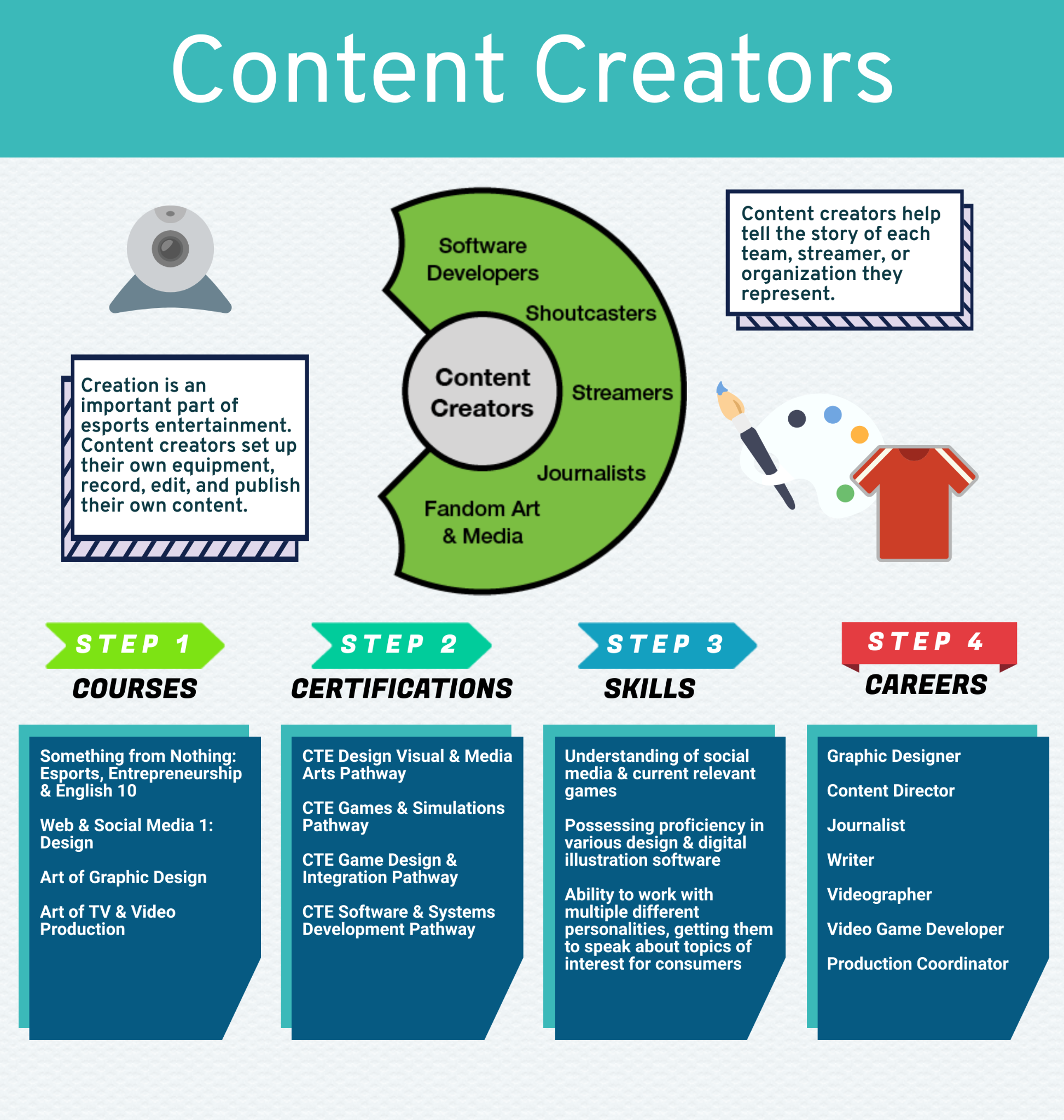Gaming habits could lead a player right to their career path. In last week’s blog, we discussed the 4 C’s of 21st-century skills (or as we like to call them, “future-facing skills”): critical thinking, collaboration, communication, and creativity. There are plenty of educational games to help develop these skills, but how do these capabilities translate into the real working world?
According to the North America Scholastic Esports Federation (NASEF), games can provide the skills for four main career pathways: strategists, organizers, entrepreneurs, and content creators.
via NASEF.org
In general, content creators are storytellers. They may be writers, artists, developers, or a combination of these. Learn more about becoming a shoutcaster, software developer, graphic designer, journalist, and more here.

via NASEF.org
Content creators can interact with games in many inventive and unexpected ways, especially as our world adapts to the changes brought on by COVID-19. For example, when the pandemic shut down all live concert venues, Enongo Lumumba-Kasongo, a Brown University Ph.D. fellow and rapper, teamed up with other Providence-based musicians and the Brown Arts Initiative to present a series of concerts in Minecraft. The event intended to give students a break from Zoom events and provide a more immersive remote experience for the local community. Check out the performance here.
via Brown.edu
Thanks to games such as Minecraft, not only are new forms of online gatherings possible, but an entirely new generation of software development is taking shape. In her Forbes article “How Video Games Are Paving The Way For The Next Generation of Enterprise Software,” Katherine Kostereva notes that former software barriers for businesses are lowering as low-code/no-code software gains popularity. Low code/no-code platforms allow users to put together strings of pre-formed code, using them as building blocks to create something more complex.
Kostereva writes that coding games “…give players the opportunity to practice problem-solving difficult problems in a low-risk environment. Furthermore, they provide instant and immediate feedback, so players can adjust their strategy as they go. These are two skills that are critical in software development. Video games pique students’ interest in programming and build technical skills simultaneously.” Essentially, the way most businesses code is changing, and numerous young people have already built many of the skills to develop software through educational video games.
Whether players are looking to be software developers, artists, designers, journalists, streamers, or anything else that falls under the content creator umbrella, there are games to help them get there. Check out the list of games below that can spark an interest that leads to future careers!
via education.minecraft.net
Minecraft has already been mentioned several times above, and for good reason. Besides being the best-selling game in the world, its special edition for education can teach just about anything, from math to biodiversity. As players code in environments of their own creation, the sky is the limit when developing future-facing skills.
via Scratch-MIT
Developed by the MIT Media Lab, Scratch is a free online platform where anyone can use programming to tell stories or create their own games. Players can animate and design to their heart’s content! Scratch is a great primer for the types of low-to-no-code software mentioned earlier in this article.
via creativepro.com
The phrase “hexadecimal color notation” might not jump off the page as an exciting topic for a video game, but “saving the world from aliens” certainly does! Learn the ins and outs of hex color code while battling aliens for the future of the earth in Hex Invaders. As any graphic designer will tell you, understanding hex codes is a huge help for establishing and maintaining precise color preferences in the content you create.
Created by Filament Games for client Publications International, Learn to Code is a game for all ages. The game includes a box set of books and a code creation app. Like many other content-creation-oriented game experiences, Learn to Code lets players learn pixel art, animation, and more, and tell their stories in their own way. Watch a trailer here.
Keep an eye out for RoboCo, our upcoming PC/VR robotics sandbox game that allows players to design and operate the robots of their dreams.
More games for building skills: